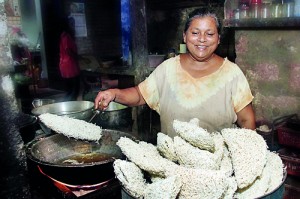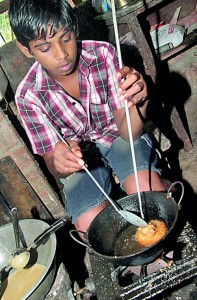Sweetmeat-maker’s life is far from sweet
Avurudu is a season of not just laughter, happiness and family fun, but for most people, especially the young, it’s the season to just indulge in as many sweetmeats as you possibly could eat. Back in the day, all the Avurudu Kevili were made by the mother of the house together with the daughters, but now with everyone being busy, places where Avurudu sweetmeats are made and sold or orders are undertaken are aplenty in the cities.
Travelling past Panadura, a little way on the Hirana road we meet an expert in this art, who has her hands full with orders this Avurudu. Her neighbours are quite used to the aroma of Kevum frying during the Avurudu season. The sizzling sound of oil in the

Lilani at work at her home in Panadura. Pix by Indika Handuwala
frying pan, the thump of the mortar and pestle grinding rice flour, and the flour drying in the sun are common sounds and sights for anyone who frequents her house. Popularly known in the area as the ‘Kevili Gedara’, the whole enterprise of making sweetmeats is conducted by mother of two, Lillian Margaret Bolonnga, with a little help from 13-year-old Ayesh Vikesh, her grandnephew.
Though just 53 years old, poverty and hard work have taken their toll on Lillian’s health. Making the Avurudu kevili is something she enjoys but there’s so much work that goes in to making any one of the sweetmeats, she says.
After her husband’s death two months ago, she has felt her age and chest and hand pains after a hard day’s work, she says sadly.
Making sweetmeats is the sole income for this family. Her grandnephew, little Ayesh has two brothers and his mother, Lillian’s neice, feeds the three children from the meagre amount she earns through rubber tapping. Ayesh is Lillian’s right hand and even during the April vacation, he wakes up early morning and is often the first in the kitchen preparing for the day’s work. Lillian very proudly says that he can make the best Konde Kevum and is the fastest when it comes to getting the Konde (the tip) of the Kevum which he does quite artfully.
She learnt the methods of making the Kevili from her husband, P.N. Perera, who had been interested in cookery, which he had learnt from his aunt. Starting the business at a young age, Perera succeeded in teaching his wife and soon it became a family business. Although their children don’t find the need to continue the trade, Lillian is happy to have found the same interest for the business that

Ayesh: Lillian’s little helper
was in her husband in her young grandnephew as well.
“If I can manage, we take about 50 orders for April. Usually just within this month I use about 250 kg of flour, the main ingredient for everything. I buy the sacks of rice from a shop nearby on loan and pay little by little as I get the money. I get the coconut treacle from Chilaw. Usually April is the month with the largest demand. In December and January also there are good sales. If there are too many orders we get some people to help us and we pay them. We never put the food for sale on shops mainly because we still can’t mass produce,” says Lillian.
At the time she and her husband began making Kevili for orders, they could manage their April budget from Rs. 25,000 to Rs. 50, 000 but now, she spends close to Rs. 200,000. But after paying the salaries of people she enlists to help and the shop bills, they only have a small profit for themselves.
Unlike many other places where the size of the goodies is seen to be reducing every year, Lillian is particular about keeping to their original sizes although the prices do increase by about Rs. 2 every year. A Konde Kevum is priced at Rs.35 and Kokis at Rs.13, Mung Kevum at Rs. 22, and an Asmi at Rs. 50 and the small Asmi at Rs. 35. They also make Athiraha, Aluva, Kalu Dodol, Savu Dodol, Helapa, Milk and Coconut toffee as well as Narang Kevum and many other types of Avurudu Kevili. “I would love to make Peni Valalu but when my husband was living it was he who always made it and I never could learn it from him,” she says, somewhat regretfully.
Lillian requests anyone who would like to help her family for a rice flour grinder and a machine to extract coconut-milk. “I’m weak and older now so I can’t do everything by hand like I used to. If anyone can donate a machine I would forever be thankful,” she says. Lillian’s telephone number is 0382231117.


